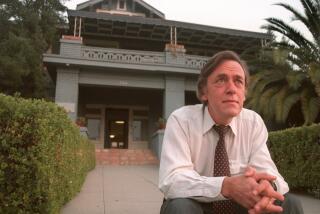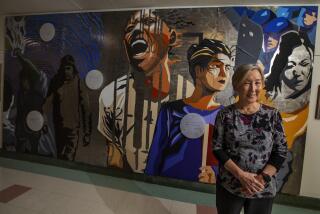S. Stephen Nakashima dies at 86; former regent voted to end affirmative action at UC campuses
S. Stephen Nakashima, a World War II relocation camp survivor and longtime attorney who voted with the conservative majority on the UC Board of Regents that banned affirmative action in UC hiring and admissions in the mid-1990s, has died. He was 86.
The former regent died of natural causes Dec. 11 at his San Jose home, according to his son, Lex.
Nakashima was appointed to the UC governing board in 1989 by Gov. George Deukmejian and was reappointed in 1993 by Gov. Pete Wilson. He served until 2001, when he resigned for personal and health reasons.
Repealing affirmative action was among the most controversial decisions that Nakashima, a second-generation Japanese American, faced during 12 years on the UC board.
The ban, proposed by Ward Connerly, a conservative African American regent, sought to restore academic achievement as the primary consideration in admitting students to UC campuses. The proposal was hotly debated, with critics contending that eliminating race and ethnicity as a consideration would greatly diminish the number of African American and Latino students while boosting the chances of Asian Americans and whites. It was narrowly adopted by the regents in July 1995 but revoked in 2001.
For Nakashima, the affirmative action ban was a clear-cut remedy for a form of discrimination that had hurt Asian Americans as certainly as had other government-sponsored actions decades earlier.
Telling his critics that they had “no monopoly on discrimination,” he often cited the bigotry he encountered in the 1940s and ‘50s in explaining his opposition to UC’s affirmative action policy. He said a white realty agent wouldn’t sell him the house he wanted in San Jose after the war, and companies wouldn’t hire him as an accountant because they didn’t trust a Japanese American to audit their books.
He also cited his wartime confinement at Arizona’s Poston Relocation Center, the largest of the 10 Japanese American internment centers. Recalling the armed guards who patrolled its perimeter, Nakashima often preferred to call Poston a concentration camp.
“I’ve never said that affirmative action has never worked,” Nakashima told the San Jose Mercury News in 1995. “But when you achieve the purposes that some programs were created for, you don’t need to keep it up. If you favor one person, you’re going to deny another person. We don’t have a limitless supply of rights.”
Born on Jan. 29, 1922, in Fresno and raised in nearby Reedley, he was the second oldest of five children of Hiteyo and Hiroshi Nakashima. After the Japanese attack on Pearl Harbor on Dec. 7, 1941, President Franklin D. Roosevelt signed an executive order authorizing the internment of thousands of Japanese Americans on the West Coast. Nakashima, his parents and siblings were sent to the camp in Poston.
Nakashima taught elementary and high school students in the camp. After a year, he was allowed to leave to work as an accountant for a defense contractor in Cleveland. As the war neared its end, he joined the Army and served stateside as a staff sergeant.
After his military duty was completed in December 1946, he entered UC Berkeley, where he earned a degree in accounting in 1948.
When he could not find a job as a certified public accountant, he earned a law degree from Berkeley’s Boalt Hall School of Law in 1951. In 1955 he established a law practice in San Jose with attorney Theodore K. Boynton that continued for nearly 40 years.
He also became involved in politics. With his wife, Sally, he was active in the Japanese American Citizens Alliance and was a national vice president. He was a major contributor to Wilson’s 1990 gubernatorial campaign and was a delegate to three Republican national conventions.
His wife died in 1999. In addition to his son, he is survived by three daughters: Dale, Jann and Mona; three grandchildren; and a sister.
More to Read
Start your day right
Sign up for Essential California for the L.A. Times biggest news, features and recommendations in your inbox six days a week.
You may occasionally receive promotional content from the Los Angeles Times.







